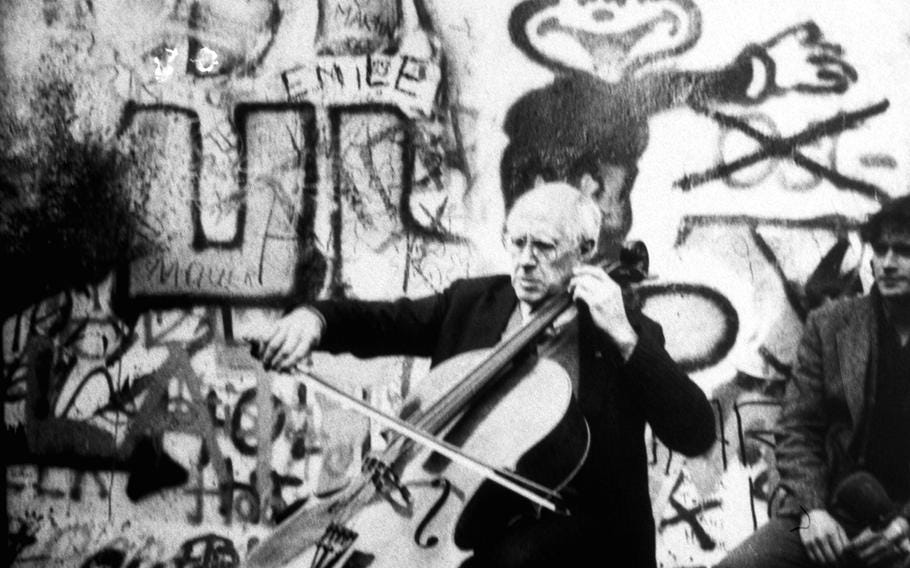The Old Man and the Cello
A love story
This is an exclusive piece for paid subscribers. Welcome to any newcomers, and thanks to my faithful readers for sticking around. As always, if you’d like to maintain a subscription or upgrade from the free tier, but you’re wavering because of price, let me know and I’m happy to give away free months. To make up for some lost time recently and ensure everyone continues to get their money’s worth from their sub, I’m planning extra exclusive content for the next week, including some post-election analysis you won’t want to miss. Meanwhile, enjoy this slice of history!
He wasn’t actually all that old, barely in his sixties in fact. He had just aged quickly. But on that November day, thirty-five years ago, all cares fell away from Mstislav Rostropovich, or Slava, as his loved ones called him. He played the cello like he always did, eyes tight shut, entirely lost in the music. It was a time to laugh, and a time to weep. It was the week the Wall came down.
I am too young to remember that week, but many of you aren’t, and I’m sure you can remember where you were when you heard or watched the first news. I’ve seen a portion of the Wall, on display at the Grand Rapids Public Museum. It was standing in a corner near the exit, labeled with a barely readable plaque. One can only guess how the dollhouse display received greater prominence in the museum than this particular bit of history. My family and I were fortunate to realize it was there instead of walking past it on our way out, as others surely had. We considered it together for a moment. Before we left, my father made a leap and reached out for the top of the wall over the glass. The rest of us weren’t tall enough to make the attempt. He caught up with us smiling.
The part of the wall pictured above behind Rostropovich is heavily graffitied, which made a striking contrast to delight the photographers who quickly scurried to the scene once someone recognized the great master. By then, he had been in exile for over a decade, but the rest of the world had embraced him with open arms. By 1989, he had the means to book a private flight from Paris when all regular flights to Berlin were full. On landing, he marched up to Checkpoint Charlie unannounced, borrowed a guard’s chair, and simply began playing Bach’s great cello suites. Footage from the day shows the scene. The photographers rub elbows in front of the crowd. The local young men stand about smoking cigarettes. One gives his to Slava when the music is over. Slava accepts it with feeling and says that the music “came from my heart.”
It’s such a short exchange, but you can catch the overflowing spirit of the man. He is magnetic, larger than life. Everyone who ever met Slava had a Slava story. I will tell just a few of the best ones.



